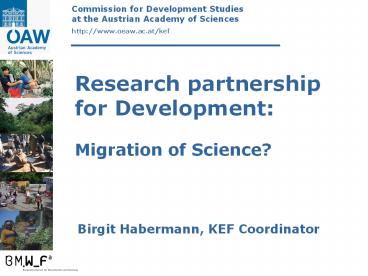Research partnership for Development: Migration of Science? - PowerPoint PPT Presentation
1 / 18
Title:
Research partnership for Development: Migration of Science?
Description:
to embed the development-political approach into science and research ... Joint Research, Joint Learning: Research partnerships in development cooperation. ... – PowerPoint PPT presentation
Number of Views:31
Avg rating:3.0/5.0
Title: Research partnership for Development: Migration of Science?
1
Research partnership for DevelopmentMigration
of Science?
- Birgit Habermann, KEF Coordinator
2
Science and the poor
- It is not surprising that the rich get richer
in a continueing cycle of growth while the
poorest are often left behind. A special effort
should be made by the powerhouses of world
science to address the unmet challenges of the
poor. - Jeffrey D. Sachs, The End of Poverty
ROLE OF RESEARCH
3
The global scientific divide
- DCs represent 78 of population but only 28 of
researchers worldwide
ROLE OF RESEARCH
4
Commission for Development Studies
- Founded in 1981 as a follow up to UNCSTD (United
Nations Conference on Science and Technology for
Development) - Head of Commission Prof. Gerhard Glatzel
- Coordinator Birgit Habermann
5
Commission for Development Studies
- Multi- and interdisciplinary platform
- Hosted by Austrian Academy of Sciences, funded by
BMWF - 30 members
Donors/ Ministries (5)
Scientific members (10)
DC international cooperation (10)
Other members (5)
6
Our aims
- to unite scientific questions with
development-political objectives - to embed the development-political approach into
science and research
7
What do we do ?
- KEF provides funding for research partnerships
- 63 KEF projects in 29 countries, 2 multinational
projects - 13 projects in implementation phase
- Annually 6-7 new projects
- Budget ca 25 000 Euro/18 months
8
KEF research partnerships
9
KEF research partnerships
10
KEF research partnerships Prerequisites for
funding
- Eligibility Austrian scientists and their
scientific partners in developing countries - Significant proportion of funds remains with
partner country - Institutional integration (capacity building)
11
What do we do ?
12
KEF Publication
- Joint Research, Joint Learning Research
partnerships in development cooperation.
13
Is there a need for scientific partnership?
- Global research questions, e.g. climate change,
international treaties, pandemic diseases,
security, - Global competition takes place in research as
well what role for Austria in the future? - Changes in Aid Architectcure (General budget
support), modalities of cooperation and
accessibility of knowledge, global awareness,
Commission for Development Studies at the
Austrian Academy of Sciences http//www.oeaw.ac.at
/kef
14
Impeding factors for partnership cooperation
- Structural issues, limited career options for
scientists - Lack of networking among Austrian institutions in
development research - Capacities in Austria often inadequately trained
to meet the high and diverse requirements lack
of training and capacity development,
Commission for Development Studies at the
Austrian Academy of Sciences http//www.oeaw.ac.at
/kef
15
Impeding factors for partnership cooperation
- Lack of policy coherence
- Demand for experts / expertise in development
cooperation a lot remains still unclear ! - No tradition in Development Studies, Development
Policy Research, - individual initiatives
struggle with structure and limitations
Commission for Development Studies at the
Austrian Academy of Sciences http//www.oeaw.ac.at
/kef
16
Impeding factors for partnership cooperation
- Resources
- Lack of an adequately equipped funding programme
(ca 140 000 Euro/year KEF funding, Austriaca 400
000 Euro/year ) - Sweden 54 Mill. Euro (2005)
Commission for Development Studies at the
Austrian Academy of Sciences http//www.oeaw.ac.at
/kef
17
Summary
- Is it the powerhouses of world science we need?
- What kind of partnership can we offer, are we
willing to offer? - Power participation what does it mean?
- Are we ready to stop dividing, categorising,
classifying the world and accept a new global
concept understanding of science?
Commission for Development Studies at the
Austrian Academy of Sciences http//www.oeaw.ac.at
/kef
18
Contact
- Birgit Habermann
- Commission for Development Studies at the
- Academy of Sciences (KEF)
- Dr. Ignaz Seipel Platz 2 1010 WIEN
- AUSTRIA
- Telefon43(0)1 515 81 3202
- Email Birgit.Habermann_at_oeaw.ac.at
- Web http//www.oeaw.ac.at/kef































